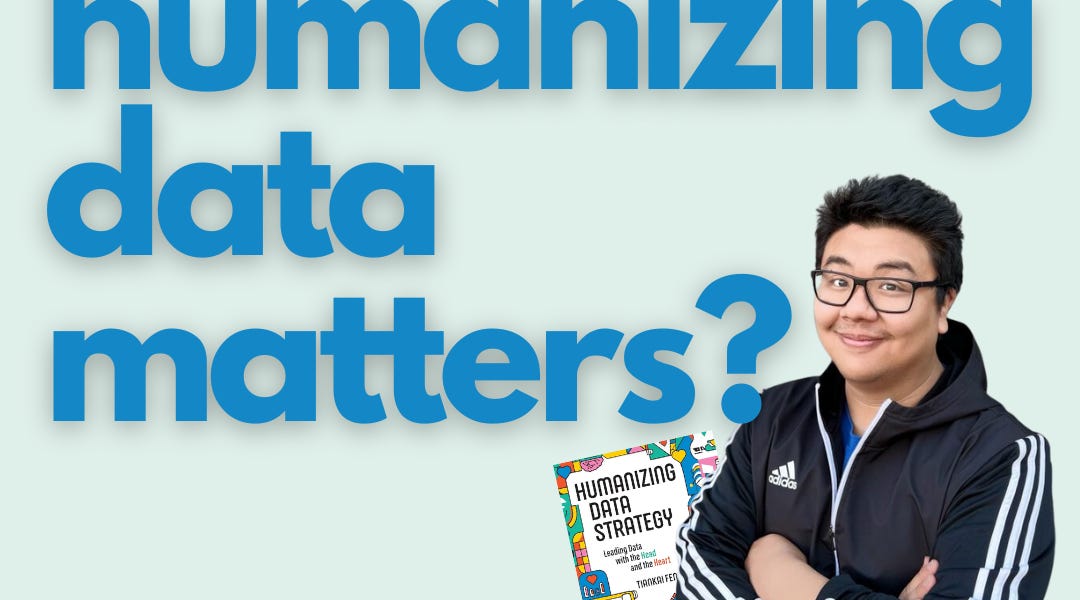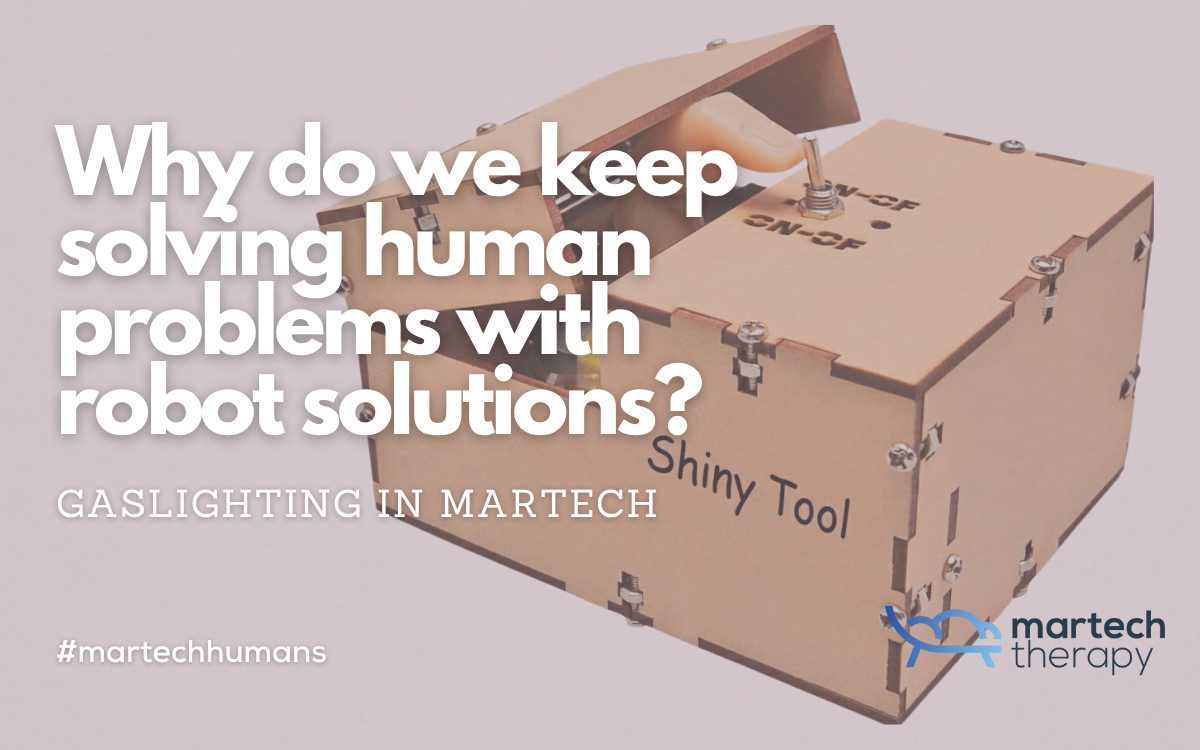Ok, I need to get this off my chest. This week in Martech feels like watching an episode of the Twilight Zone. Treasure Data launches their AI Marketing Cloud. Hightouch teases new Agents feature. Tealium rolls out their Behavioral Insight Agent. Meanwhile, McKinsey drops a report essentially saying "your technology is writing checks your operating model can't cash", and Hightouch's "Has Martech failed marketers" report includes data showing that marketers think their tools are broken.

Now take a sip of your coffee before I reveal the plot twist. Ready? Everyone's basically saying the same thing without saying it -> we have a people problem dressed up as a technology problem, and nobody wants to admit the emperor's organizational chart has no clothes.
When data takes the fall
Hightouch's report deserves credit for uncovering an important truth: 75% of tool problems are actually data problems. That's genuinely valuable insight. But here's where it gets interesting in my opinion. Their report shows marketers can't use 70% of their stack, yet the solution being pitched is, naturally, better data infrastructure and, wait for it, more AI agents.
I'm not knocking the technology. These new AI capabilities are genuinely impressive, bordering on magical, and I am deploying them with my clients. But there's something almost endearing about our industry's relentless optimism that the next tool will finally be the one that transcends organizational dysfunction. It's like watching someone try to fix a broken marriage by buying a nicer car.
David Chan from Deloitte, quoted in the Hightouch report, comes closest to naming the real issue when he talks about "leaning into collaboration with the very teams once seen as blockers." But even this frames it as an opportunity rather than what it actually is, table stakes for making any of this technology work.
Even McKinsey's report has some solid advice for those struggling with the basics, for companies looking to jump on the AI hype-train. And I have to hand it to them, their advice is music to my ears:
Making [grasping Martech AI's opportunity] happen, however, requires companies to elevate martech from a collection of disparate tools to a strategic enterprise asset that is championed by the C-suite and embedded in the organization’s long-term vision.
Besides C-suite Martech fluency, they speak of strong data strategy and digital-first ways of working. Look, I don't want to label myself the Nostradamus of Martech, but these are not all really new pieces of advice, but welcome nonetheless. For those running into walls when working with Martech, it's all we have been wishing for for years.
The pattern we refuse to see
Here's the cycle I've watched play out more times than I've seen Star Wars (and I've seen Star Wars a lot, just ask Scott Brinker, oh and Andor is the best):
Company buys impressive martech tool. Tool requires data from multiple systems. Systems are owned by different teams. Teams have different priorities, incentives, and definitions of success. Integration stalls. Manual workarounds emerge. Tool underperforms. Vendor diagnoses "data quality issues". Company buys data solution. Rinse, repeat, retire early if you're selling the solutions.
McKinsey's report uses the phrase "technology is outpacing operating models", which is consultant-speak for "you bought a spaceship but your org chart is still designed for horses". They're not wrong, but framing it as technology moving too fast lets organizations off the hook. The technology isn't outpacing anything. Organizations are choosing to buy new tools rather than fix how they work.
The comfortable deflection
The Martech industry has perfected the art of the comfortable deflection. When campaigns underperform, we blame attribution models. When attribution breaks, we blame data silos. When data silos persist, we blame integration challenges. When integrations fail, we blame technical debt. It's turtles all the way down, except every turtle is avoiding eye contact with the fact that marketing and IT haven't had an honest conversation since... well, I don't know when.

This isn't vendors being malicious. They're building genuinely useful tools that solve real problems, assuming those problems exist in a vacuum. The new agents from Treasure Data, Hightouch, and Tealium could absolutely transform marketing operations if marketing operations existed in a world where departments actually operated together.
But pointing at organizational dysfunction doesn't sell software.
You know what sells software? "Data readiness assessments". Or "AI maturity models". Maybe even "Integration roadmaps". These are things you can put in a PowerPoint and present to a board. "Your CMO and CTO need couples therapy" is not.
Architecture as destiny
David Joosten on the Humans of Martech podcast nailed something crucial by stating that:
"Architecture isn't just technical infrastructure, it's the invisible scaffolding that shapes team behavior. Data teams build for accuracy and control, while marketers push for agility and access. The architecture decides which side wins." When the design prioritizes risk management, marketers spend months waiting for queries to be approved. When it prioritizes freedom without governance, trust breaks down the first time a campaign misfires. Neither version scales.
This is the mechanism behind our industry-wide dysfunction. The tension between marketing and IT isn't personality conflicts, it's architecture manifesting as behavior. We're launching AI agents into organizations still running on architectural decisions made when Facebook required a college email address.
The humans in the machine
What's particularly rich about this moment is that we're launching AI agents, essentially artificial humans, to work around the problem that actual humans can't work together. We're building synthetic collaboration because organic collaboration is too hard. There's a science fiction novel in here somewhere, probably a dystopian one. Too bad Isaac Asimov already wrote "Foundation", because that is what we truly need.

The unnamed marketers in these reports aren't struggling because they're incompetent or because the tools are bad. They're struggling because they're being asked to deliver integrated customer experiences using dis-integrated organizations. They need engineering help not because they're technically deficient, but because the data they need lives behind organizational walls that require political capital, not technical skill, to breach.
The actual solution nobody wants
Let's be honest, just for a second, and agree that everyone reading this knows what the actual solution looks like. It looks like marketing and IT sitting in the same meetings, sharing the same goals, and being measured on the same outcomes. It looks like data governance that's about enabling access, not protecting turf. It looks like incentive structures that reward collaboration over empire building.
But that's hard. That requires difficult conversations, changed job descriptions, and possibly admitting that the way we've been organizing companies for the last 20 years doesn't work anymore. It's much easier to buy another tool that promises to bridge the gap, integrate the systems, or use AI to magically surface insights across silos.

Podcast: Tiankai Feng on why humanizing data matters
Moving forward without moving forward
I'm not suggesting vendors stop innovating or that these new AI agents aren't valuable. They really and truly are. In organizations that have done the hard work of aligning their human operating systems, these tools will be transformative. The problem is pretending the technology can skip the hard part.
The great Martech gaslight isn't that vendors are lying about what their tools can do. It's that we've all agreed to pretend organizational problems have technological solutions. We've created an entire industry around working around the problem instead of solving it.
Until we stop that particular charade, we'll keep having this conversation every time someone launches a new platform, CDP, agent, or whatever acronym we're genuflecting to next quarter. The tools will keep getting smarter while the organizations using them keep making the same very human mistakes.
The real innovation isn't going to be another AI agent. It's going to be the first company that admits maybe, just maybe, we should debug the humans before we deploy another robot.




Discussion